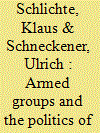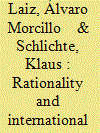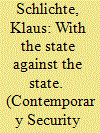|
|
|
Sort Order |
|
|
|
Items / Page
|
|
|
|
|
|
|
| Srl | Item |
| 1 |
ID:
143538


|
|
|
|
|
| Summary/Abstract |
This article serves as an introduction to a special section on the question of the legitimacy of non-state armed groups. Starting with a short discussion of the literature on armed groups as political actors, the authors emphasize the importance of the often-underestimated dimension of legitimacy. After having conceptualized legitimacy in more detail, the article addresses three key challenges armed groups usually face regarding the politics of legitimacy: first, they need to legitimize the use of violent means; second, for moral and material support, they depend on beliefs of legitimacy; and third, they need to simultaneously address various domestic and international audiences. Finally, the authors highlight a number of pending questions for further research on armed groups.
|
|
|
|
|
|
|
|
|
|
|
|
|
|
|
|
| 2 |
ID:
094140


|
|
|
|
|
| Publication |
2010.
|
| Summary/Abstract |
This article addresses the causes and dynamics of spin-off violence by paramilitary groups that developed in Serbia in the early 1990s. It shows that some forms of violence that challenge the state's monopoly come into being due to decisions of state agencies. But delegated violence easily develops a life of its own, and therefore the decisions of state leaders are not the only variable, perhaps not even an important one, needed to explain the dynamics of violence once the turmoil of war has started. In retrospect, it seems as if warfare was just an episode in the political life of militias or the political groupings behind them. Violence was just one means among others in the fight for political chances. Therefore, the emergence and the life of these groups have to be explained as attempts of single political entrepreneurs to achieve the accumulation of power through the exertion of violence
|
|
|
|
|
|
|
|
|
|
|
|
|
|
|
|
| 3 |
ID:
154042


|
|
|
|
|
| Summary/Abstract |
Rationalization, a core concept of Max Weber’s sociology, has so far largely been ignored in International Relations (IR) theory discussions, although his ideas about rationalization open new pathways for theorizing modernity and conflict. We revisit Weber’s concepts of rationalization and domination to show the limits of two key bodies of related knowledge in IR: scholarship on international organizations as bureaucracies and ideas on rationalization in the world polity approach. Rereading Weber’s approach to rationalization provides a distinct ground for our understanding of the current internationalization of rule. We illustrate the contribution our approach to rationalization makes by looking at budget support to sub-Saharan African states, and Mozambique in particular. The article concludes with a discussion of the implications that a critical rereading of Max Weber has for international politics.
|
|
|
|
|
|
|
|
|
|
|
|
|
|
|
|
| 4 |
ID:
084055


|
|
|
|
|
| Publication |
2008.
|
| Summary/Abstract |
is the declared objective of international donors in many African contexts and elsewhere. Uganda, where a civil war ended 20 years ago, can serve as a showcase in order to see what the outcome of internationalised post-war policies is. Analysing the dynamics around the state's armed forces and the problems of taxation, this article argues that the outcome is not statebuilding but the internationalisation of rule. This constellation, nowadays euphemistically called 'global governance', may show the future of other current post-war interventions.
|
|
|
|
|
|
|
|
|
|
|
|
|
|
|
|
| 5 |
ID:
090434


|
|
|
|
|
| Publication |
2009.
|
| Summary/Abstract |
In a world of growing security challenges, non-state armed actors have captured significant attention from scholars concerned with regime stability and the consolidation of national states. But the preoccupation with national political dynamics has eclipsed the study of non-state armed actors who struggle to secure economic dominion, and whose activities reveal alternative networks of power, authority, independence, and self-governance unfolding on a variety of territorial scales both smaller and larger than the nation-state. With a focus on actors as wide-ranging as private police, gangs, and mafias, this article charts the proliferation and significance of non-state armed action structured around economic activities, and assesses the nature of violence and insecurity generated by these activities in comparison to more conventional politically oriented non-state action. Drawing evidence primarily from middle-income countries of the global south, where political regimes are relatively more stable but a wide variety of non-state armed actors still proliferate, it examines the new 'spatiality' of non-armed state action directed toward economic sovereignty, argues that it forms the basis for alternative imagined communities of allegiance, and assesses the implications for the future of the traditional nation-state.
|
|
|
|
|
|
|
|
|
|
|
|
|
|
|
|
|
|
|
|
|